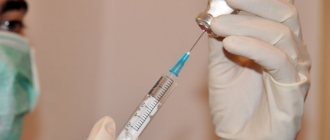Injection contraception is on a par with oral contraceptives (pills) in terms of effectiveness, but in Russia few people agree to it.
Injectable contraceptives are hormonal drugs that are injected into a woman’s muscle or under the skin once every few weeks.
Benefits of injections against unplanned pregnancy:
- no need to remember to take pills daily;
- vomiting and diarrhea do not affect the effect of the drug;
- There is no need to use additional contraceptive measures if you vomit, have diarrhea, or miss a pill.
Main disadvantages:
- the effect of the drug cannot be canceled at any time; if a subcutaneous implant can be removed, then an injectable contraceptive cannot;
- you need to contact the clinic in order to start and continue hormonal injections for pregnancy.
Contraceptive injection for 3 months
The contraceptive injection is given once every three months, on the fifth day of menstruation (a total of 4 times during the year). The injection is injected into the buttock or shoulder bone. The effect is much higher than that of other hormonal drugs (up to two pregnancies per 100 people per year).
Such injections are practically safe to use, and they do not affect the possibility of getting pregnant in the future. According to world statistics, there have been no recorded cases of infertility that would have been caused by such injections.
But it is important not to forget that after discontinuation of the drug, reproductive function is not immediately restored. It is possible to become pregnant after using injections no earlier than six months to a year. This is exactly the time period needed for the normal functioning of menstruation.
Injectable contraception Depo Provera
In Russia, only the drug Depo Provera (Depo Provera) from Pfizer is approved. Its price ranges from 100-200 rubles per ampoule. This is the most popular injectable contraceptive in the world. It is used by several million women in more than 100 countries.
How the drug works
Hormonal contraceptives contain a progesterone analog or its combination with any estrogen.
These are artificially synthesized female sex hormones, the levels of which change during the menstrual cycle. The brain reacts to the introduction of artificial hormones and releases fewer natural substances that can trigger ovulation and prepare the uterus for pregnancy.
Depo-Provera is a drug called medroxyprogesterone (an analogue of progesterone) that is injected deep into the muscle and is gradually released from it. The injectable depot form was adopted in the United States in 1960. It has been used as a means of contraception since 1992.
The action of the drug is based on 3 effects:
- Suppression of ovulation.
- Thickening of mucus in the cervical canal, which prevents sperm from moving through the woman’s genital tract.
- The endometrium changes so much that it cannot accept the developing embryo.
Advantages
Depo-Provera is recommended for women of late reproductive age and older, when there are restrictions on taking oral contraceptives. It is used for uterine fibroids, endometriosis, and hyperplastic processes in the endometrium.
Depo-Provera also reduces the risk of developing endometrial cancer, inflammation of the genital organs and vulvovaginal candidiasis (thrush).
Flaws
Depo-Provera is more suitable for women who are planning a pregnancy in the distant future. The first ovulation after discontinuation of the drug can occur even after 10 months; in some cases, pregnancy occurs only 2 years after stopping injections.
Contraindications
Depo-Provera does not contain estrogens, which increase blood clotting.
But while taking it, the risk of blood clots also increases. It is not prescribed if a woman has blood clots or a clear tendency to form them. This is dangerous because a blood clot can block an important vessel in the heart, brain, lungs and other organs. If blood relatives had a similar situation, you need to inform your doctor about it.
Other contraindications are liver disease and bleeding from the genital tract, the cause of which has not been established.
Depo-Provera is contraindicated during pregnancy and breastfeeding. Medroxyprogesterone can cause fetal malformations. But in cases of pregnancy occurring after the injection, there was no negative effect on the fetus or an increased risk of ectopic pregnancy. However, before taking such a long-term contraceptive injection, you need to make sure there is no pregnancy.
If there was an allergic reaction to the drug or it was very poorly tolerated, it will not be re-prescribed either.
Side effects
The most common side effects are irregular bleeding from the genital tract, absence of menstruation, headache and depression.
Depo-Provera negatively affects bone density, resulting in increased bone fragility. It is not entirely clear whether this effect can be reversed or not. Depo-Provera may increase your risk of osteoporosis and fractures in the future. Therefore, in the United States it is not recommended to use this drug without interruption for more than two years.
This is especially important for teenagers whose skeleton is not yet fully formed, as well as for women whose blood relatives have osteoporosis.
Another dangerous side effect is the formation of blood clots, which is the most important obstacle to hormonal contraception.
Nausea, abdominal pain, and increased body temperature may also occur. Pain in the mammary glands and even the release of breast milk are possible.
Due to the action of Depo-Provera, hair loss or male-pattern hair growth, changes in body weight, acne, and a moon-shaped face may occur.
The body can react to Depo-Provera, like any other drug, by developing allergies of varying severity.
Conditions for which it is prescribed with caution
With special attention, Depo-Provera is prescribed for epilepsy, migraine, asthma, heart and kidney failure, diabetes and depression.
Mechanism of action
The drug contains the hormone progesterone, which has a prolonged effect. It enters the body and is gradually released, helping to maintain the desired concentration of the drug in the blood.
As a result, there is a significant decrease in the production of hormones responsible for ovulation and the maturing egg - these processes are now impossible. Cervical mucus becomes very viscous, the walls of the cervix increase, the canal decreases and becomes narrow. All of the above completely inhibits the onset of pregnancy.
The contraceptive reaches its maximum concentration in the body approximately on the twentieth day after the injection, for this reason, in the first month, doctors recommend protecting yourself with a condom.
Who is it suitable for?
Any method of contraception is much better than abortion. Women who cannot regularly use progestogens can switch to contraceptive injections. What are the reasons for prescribing such a drug:
- An active lifestyle, very frequent flights, and constant business trips create an additional risk of finding yourself without certain protection at the right moments.
- Constant failure to take oral contraceptives. If these drugs are used irregularly, the function of the genital organs can be destabilized, as well as their effectiveness reduced, which will lead to a possible unwanted pregnancy.
- If there are diseases for the treatment of which long-acting progestin agents are used. The effect (contraceptive) may become a side effect in this case, despite its reliability.
What is the effect of contraceptive injections?
The effect of contraceptive injections is close to 100%. In the body, when using this method, ovulation is blocked, so fertilization is practically excluded. Our popular drug, Depo-Provera, is affordable (about a thousand rubles) and one injection lasts for three whole months. Compared to other contraceptives, this one is much more economical. There are minimal contraindications (oncology, cardiovascular diseases). There are tangible advantages in the form of a decrease in menstruation, it becomes painless, some people forget what PMS is.
How to use Depo-Provera
Any hormonal method of contraception must be selected together with a doctor. The drug is administered for the first time on the 5th day of normal menstruation to ensure there is no pregnancy. Next 2 weeks you need to use an additional method of contraception.
Repeated injections are carried out every 3 months. If you are late, the contraceptive effect will be temporarily reduced.
It is important! If alarming symptoms occur after administration of Depo-Provera, you should immediately consult a doctor. This may include bleeding from the genital tract, severe abdominal pain, depression, and breathing problems. As well as itching, prolonged pain, redness, suppuration or bleeding at the injection site.
What are the advantages of contraceptive injections?
- getting rid of daily pill taking;
- no contraindications for smoking;
- does not cause a risk of infertility;
- effective protection (about 99%);
- almost all drugs can be used during breastfeeding;
- can be used at any age;
- inhibits the development of certain diseases: uterine fibroids, mastopathy, endometriosis;
- The drug is not contraindicated for car enthusiasts (does not distract attention); an accessible and inexpensive method of contraception.
Disadvantages of contraceptive injections:
- in rare cases causes cycle (menstrual) disruption;
- there is a small chance of weight gain;
- rarely – decreased libido;
- there is no protection against various infections (unlike a condom) that are sexually transmitted.
- prohibited if there is a history of depression, any bleeding, oncology, or impaired blood clotting;
- if you use this type of contraception, you should visit your gynecologist at least twice a year;
- if side effects occur, it will not be possible to immediately eliminate the cause, since the effect of the drug is three months and it is difficult to remove it from the body;
- in rare cases, the risk of osteoporosis increases;
- after the drug is discontinued, the desired pregnancy may not occur as soon as desired (about a year).
Contraceptive injections for women
Injections with a contraceptive effect are classified as hormonal contraceptives. Hormonal contraceptives work in two ways:
- Suppression of ovulation. A hormonal contraceptive delivers a synthetic hormone progestogen into the bloodstream, similar to the female hormone progesterone, the so-called pregnancy hormone. The result is a false fertilization effect that suppresses ovulation.
- Changes in the uterine mucosa. Progestogen affects the composition of cervical mucus. It becomes more viscous, which makes it difficult for the sperm to enter the uterus. If fertilization of the egg does occur, the altered mucosa will not allow the egg to implant into the wall of the uterus. Pregnancy will not occur.
A gynecologist should prescribe hormonal contraception. Don’t trust cosmetologists with this, don’t prescribe hormonal injections yourself.
Table: comparative analysis of various types of hormonal contraceptives
| Type of hormonal contraceptive | Regularity of use | How to use | Refusal of contraception | Doctor's help | approximate cost |
| Pills | Every day, at the same time | Oral | The possibility of becoming pregnant occurs when you stop taking it. | Not required | From 600 rub. |
| Patch | 1 time per week | Attaches to any part of the body | You can cancel the contraceptive effect any day by removing the patch. | Self-stick and remove | From 900 rub. |
| Ring | 1 time per month | Inserted into the vagina | You can cancel the contraceptive effect any day by removing the ring. | Enters and removes independently | From 1100 rub. |
| Spiral | Service life - up to 5 years | Inserted into the uterine cavity | You can cancel the contraceptive effect any day by removing the IUD. | Can only be inserted and removed by a doctor | 4–8 thousand rubles |
| Hormonal implants | Service life - up to 5 years | Inserted into the inner forearm | You can cancel the contraceptive effect any day by removing the implant. | Injected subcutaneously by a doctor | From 10 thousand rubles |
| Injection | Once every 8–13 weeks | Placed in the shoulder, abdomen, buttocks or thigh | The contraceptive effect ceases only after the injection expires. | Done by a doctor or independently | From 200 rub. |
Preparations for contraceptive injections
Modern injection contraception uses several drugs. Most popular in the world:
- Depo-Provera (Depo-Provera);
- Sayana Press (Sayana Press);
- Noristerat (Noristerat, or Net-En).
The duration of the injections and the price depend on the chosen drug.
Table: drugs for hormonal contraceptive injections
| A drug | Manufacturer country | Hormone dosage for 1 injection | Duration of action | Features of the drug | Price |
| Depo-Provera | USA | 104 to 150 mg | Up to 13 weeks | Most common in the Russian Federation and the countries of the former USSR. | From 200 rub. for 150 mg |
| Sayana Press | USA | 150 mg | Up to 13 weeks | The newest drug is positioned as an affordable analogue of Depo-Provera for poor countries. | $1 per injection |
| Noristerat | Germany | 200 mg | 8 weeks | Most common in European countries, also supplied to India and Africa. | From 500 rub. per injection 200 mg |
Photo gallery: preparations for hormonal contraceptive injections
Sayana Press is sold in African countries
The drug Depo-Provera is sold in the form of disposable syringes with a ready-made dosage for injection
The drug Noristerat is sold in the form of ampoules.
How does the procedure work?
The drugs are administered intramuscularly into the buttock, abdomen or thigh, and sometimes into the shoulder. In medical institutions, only disposable syringes are used for the procedure. The likelihood of inflammation at the injection site is small. It can be completely eliminated if disinfection measures are followed. Allergic reactions to drugs are extremely rare.
You can give birth control injections to yourself if you have experience. In this case, it is more convenient to inject the product into the stomach or thigh. For home use, Depo-Provera and Sayana Press are produced in the form of disposable syringes with the required dosage. A woman just needs to remove the protective cap from the syringe and inject the solution.
If injectable contraception suits you, it makes sense to learn how to inject yourself
The effectiveness of injectable contraception
When used correctly, the injection is more than 99% effective in preventing pregnancy. According to the Pearl Index, the number of unplanned pregnancies during a year of using contraceptive injections ranges from 0.3 to 1.4 per 100 women.
How long can you use this method of contraception?
There are no age numbers as such. Each organism is individual. If there are no contraindications to injections and a woman does not want to get pregnant, then they can be done until the onset of menopause. But you need to monitor your health and visit your gynecologist once every 6 months to undergo a full medical examination in order to exclude possible contraindications that have arisen. The effectiveness of hormonal injections does not change over time and remains at a high level, as before.
Do I need to use protection after the first Diferelin injection?
Many questions arise around the drug Diferelin. It causes the so-called “artificial menopause”. Women are concerned about the question: “Is there a chance of getting pregnant after the first injection?” Diferelin stimulates the pituitary gland and increases the levels of pituitary hormones, but ovulation will not occur. But you need to keep in mind that there are very rare exceptions, and some doctors recommend playing it safe. During the first month, hyperstimulation occurs (there is a chance of becoming pregnant), for this reason a condom should be used.
Injections during breastfeeding
After you give birth, the injection can be given immediately, but only if breastfeeding is not part of your plans. In this case, such a procedure can be applied only after six weeks. If this injection is given in the first 21 days, then the drug’s protection will work immediately, but if the injection is made after 21 days, then there will be a need for additional contraception within a week.
If you use this method after giving birth, your periods may be irregular and there may be some side effects.
On what day of the cycle should the injections be given?
There are two strategies when choosing a date for injection contraception. Choose what suits you:
- injection on any day of the menstrual cycle. The contraceptive effect occurs 7 days after the injection;
- injection in the first 5 days of the cycle. Protection against unwanted pregnancy is provided immediately after the procedure.
Injections after childbirth
When breastfeeding, a contraceptive injection is recommended 6 weeks after birth. The protection begins to work 7 days after the injection. The use of contraceptive injections during lactation is safe for the mother and does not pose any risks to the child.
If you are not breastfeeding, a hormonal injection can be given directly on the day of birth or a few weeks later. The choice of date depends on how quickly you plan to begin sexual activity.
Table: choosing the date of the injection after childbirth (if you refuse lactation)
| Date of injection | When does protection against unwanted pregnancy begin? | Additional side effects |
| From 1st to 21st day after birth | On the day of the injection | Heavy and irregular vaginal bleeding in the first weeks after childbirth |
| On the 21st day after birth and later | 7 days after the injection | No |
Injections after miscarriage
A miscarriage or abortion is not a contraindication to the birth control pill. It can be done on the same day that these events occurred. In this case, the effect of contraception occurs on the day of the injection.
If you give the injection later, more than 5 days after a miscarriage or abortion, then protection occurs within a week.











